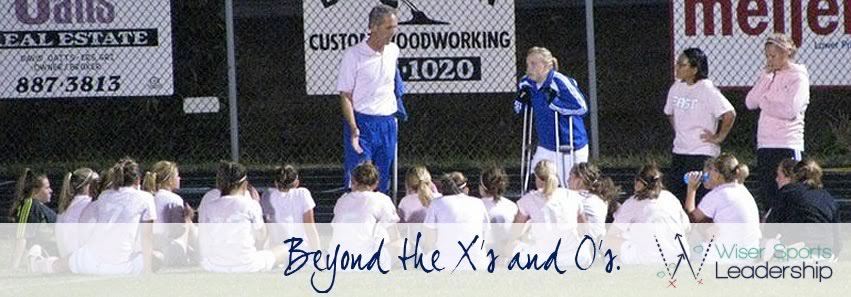CAN YOU DEAL WITH SEASON ENDING LOSS?
DeAngelo Wiser
We see a lot of happy teams and coaches celebrating championships on social media, but how about those on the other end of the scoreboard? What was their reaction in a big game?
We often see players crying and expressing a wide range of emotions, but how about the coach or coaches? They do their best to stay strong and care for their players during this tough time, but for how long after that final horn? What’s next for them?
So I ask, how will you handle a season-ending loss? I’m not talking about your players or addressing your team. How do you personally deal with it? Many coaches have shared with me it’s one of the toughest times of the season, and through my own coaching experience I can agree fully.
Everything comes to a screeching halt. No more practices to plan. No more bus requests. No more interviews, no more games, no more demands. As coaches, we all thrive on demands and challenges. Days off or the end of the season are tough. So what now?
For most of us, it’s like a heavy fog has moved in and the coaching energy has dissipated. Often we head down that “should have, could have, what if road.” You know the one. That imaginary dirt road littered with dusty championship trophies that have our team’s name on them. It’s also the one where you beat yourself up with thoughts of, “did we really lose?… what if that goal had gone in? … I should have made this adjustment,” etc. And the one thought we can’t get out of our heads is, “I’ve let my team down.”
It’s something we all do, but it’s wasted energy draining our ability to function.
So can we avoid this situation completely? I don’t think so. If the game and your team mean anything to you, you’ll have these thoughts when you lose to end the season, and need time to sort it all out. The better question may be, “What can I do to reduce the time I feel this way?”
Many coaches take vacations directly after the season to completely get away and recharge their batteries. Personally I’ve found you can’t escape those emotions and thoughts for a while, regardless if you’re half way around the world.
So here are my suggestions:
ROUTINE
Looking that loss right in the eye may be your best therapy. You’ll find top level coaches in their office the next day after their season ends. In their view, it serves no purpose to feel sorry for yourself or your team. After all, you’re the leader and you have to remain strong even when it’s tough. It doesn’t mean the loss doesn’t hurt. It’s just their way of competing against it. Keeping a routine even when the season ends is one of the best things you can do. It gives you purpose and hope for next season. You certainly won’t have as much to do as you would if you were still playing, but it’s enough to get you through this tough time. Take the time you would be practicing and work on next season.
PLANNING
Take what you learned from the loss and use it to your advantage in planning practice sessions and what you want to accomplish next year. Work on your schedule. Plan your own camps or team camps your team will attend. Add some variety to your schedule such as a weekend trip against some top teams. Research some new team building activities for ropes courses, or white water rafting. Also, think about some Friday night cookouts. These will bring a smile to your face as you think about all the players you have coming back, and what your team can accomplish.
FEED YOUR PASSION
Attend as many clinics, conventions or residential courses as possible. If you haven’t already, plan on starting or achieving the highest level license or diploma in your sport. Spending time with your colleagues will teach many lessons, such as that all coaches experience setbacks and wonderful moments. It’s also a great time to share strategies and ideas that have worked or failed miserably. Your passion batteries will be recharged in this setting, and, more importantly, you’ll see you’re not alone in anything you’ve experienced.
PROMOTE/ASSIST
Set up speaking engagements with your local organizations promoting your program and get your team involved with charity events or businesses that need volunteers to assist those in need. Nothing shows us how un-important winning or losing a game is than seeing those who need our help and the joy or smiles we see. The lessons learned in this setting will last you and your players a lifetime.
MEET WITH YOUR TEAM
Meet with your team as soon as possible with the plans you have for next season. They also will be experiencing a range of emotions from the season ending. Let them plan or create some of the activities for next year. They need a sense of purpose and relief as well. Talk with the young players you’ve recruited or who are in the feeder system of your program. Let them know how excited you are about them joining your team.
VACATION
I know, I know. I said earlier you can’t escape the emotions of losing after the season. I still stand behind that statement, but the key is the timing. Wait until you’ve established somewhat of a routine and gotten over the sting. You’ll enjoy your vacation with those who care about you most when the dust has settled, and you’re thinking about next season with a smile and all the possibilities.
Every coach is different. We all have to deal with that season ending loss in our unique way. None of us wants it to happen, and it’s hard not to take it personally. Often our players have no idea the anguish we feel at that moment. But just like our players, we are resilient, we just don’t bounce back as quickly.
Experience can help in those situations, but it’s not a cure. There aren’t any quick fixes or solutions, just the knowledge that we’ll get through it. Getting back up and into your routine will lead you to a renewed passion for next season. That energy will come back strong as you realize you have the greatest job in the world!
Keep inspiring. Your players are counting on you.

